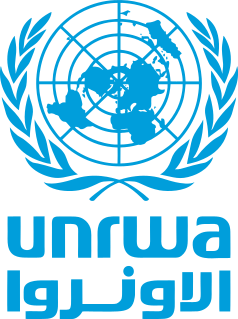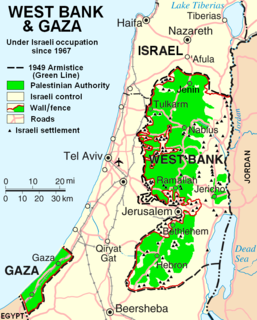
The Palestinian National Authority is the interim self-government body established in 1994 following the Gaza–Jericho Agreement to govern the Gaza Strip and Areas A and B of the West Bank, as a consequence of the 1993 Oslo Accords. Following elections in 2006 and the subsequent Gaza conflict between the Fatah and Hamas parties, its authority had extended only in areas A and B of the West Bank. Since January 2013, the Fatah-controlled Palestinian Authority uses the name "State of Palestine" on official documents.

Created in December 1949, the United Nations Relief and Works Agency for Palestine Refugees in the Near East (UNRWA) is a relief and human development agency which supports more than 5 million registered Palestinian refugees, and their patrilineal descendants, who fled or were expelled from their homes during the 1948 Palestine war as well as those who fled or were expelled during and following the 1967 Six Day war. Originally intended to provide jobs on public works projects and direct relief, today UNRWA provides education, health care, and social services to the population it supports. Aid is provided in five areas of operation: Jordan, Lebanon, Syria, the Gaza Strip and the West Bank, including East Jerusalem; aid for Palestinian refugees outside these five areas is provided by UNHCR.

The Israeli–Palestinian conflict is the ongoing struggle between Israelis and Palestinians that began in the mid-20th century. The origins to the conflict can be traced back to Jewish immigration, and sectarian conflict in Mandatory Palestine between Jews and Arabs. It has been referred to as the world's "most intractable conflict", with the ongoing Israeli occupation of the West Bank and the Gaza Strip reaching 52 years.
The history of the Israeli–Palestinian conflict began with the establishment of the state of Israel in 1948.
The politics of the Palestinian National Authority (PNA) take place within the framework of a semi-presidential multi-party republic, with a legislative council, an executive president, and a prime minister leading the cabinet.
Issues relating to the State of Palestine and aspects of the Israeli–Palestinian conflict occupy repeated annual debate times, resolutions and resources at the United Nations. Since its founding in 1948, the United Nations Security Council, as of January 2010, has adopted 79 resolutions directly related to the Arab–Israeli conflict.

Operation Hot Winter, also called Operation Warm Winter, was an Israel Defense Forces military campaign in the Gaza Strip, launched on February 29, 2008 in response to Qassam rockets fired from the Strip by Hamas onto Israeli civilians. At least 112 Palestinian militants and civilians, along with three Israelis, were killed, and more than 150 Palestinians and seven Israelis were injured.

The Gaza–Israel conflict is a part of the wider Israeli–Palestinian conflict.

The Gaza War, also known as Operation Cast Lead, also known in the Muslim world as the Gaza Massacre and the Battle of al-Furqan by Hamas, was a three-week armed conflict between Palestinians in the Gaza Strip and Israel that began on 27 December 2008 and ended on 18 January 2009 in a unilateral ceasefire. The conflict resulted in between 1,166 and 1,417 Palestinian and 13 Israeli deaths.

Pakistan–Palestine relations are the bilateral relationship between Islamic Republic of Pakistan and the Palestinian Authority. Palestine has an embassy in Islamabad which was inaugurated on 31 January 2017. Pakistan fully supports the proposal of the creation of an independent Palestinian state. Due to Pakistan's pro-Palestinian stance, bilateral relations between Pakistan and Israel have continuously wavered over the last few years. Former President Musharraf stated that Pakistan will recognize Israel once a Palestinian state is internationally recognized. Pakistan frequently provides edible and non-edible aid to Palestinian Authority.

Russia–Palestine relations is the bilateral relationship between the Russian Federation and the State of Palestine.
Events in the year 2011 in the Palestinian territories.

Egypt–Palestine relations are the bilateral relations between the Arab Republic of Egypt and the State of Palestine. Egyptian President Gamal Abdel Nasser was a strong supporter of the Palestinian cause and he favored self-determination for the Palestinians. Even today Egypt maintains strong relations with the Palestinian Authority and it favors peace between both Israel and Palestine.
The Battle of Gaza, also referred to as Hamas' takeover of Gaza, was a military conflict between Fatah and Hamas, that took place in the Gaza Strip between the June 10 and 15, 2007. It was a prominent event in the Fatah–Hamas conflict, centered on the struggle for power, after Fatah lost the parliamentary elections of 2006. Hamas fighters took control of the Gaza Strip and removed Fatah officials. The battle resulted in the dissolution of the unity government and the de facto division of the Palestinian territories into two entities, the West Bank governed by the Palestinian National Authority, and Gaza governed by Hamas.

The 2014 Israel–Gaza conflict also known as Operation Protective Edge and sometimes referred to as the 2014 Gaza war, was a military operation launched by Israel on 8 July 2014 in the Hamas-ruled Gaza Strip. Following the kidnapping and murder of three Israeli teenagers by Hamas members, the IDF conducted Operation Brother's Keeper to arrest militant leaders, Hamas fired rockets into Israel and a seven-week conflict broke out. The Israeli airstrikes and ground bombardment, the Palestinian rocket attacks and the ground fighting resulted in the death of thousands of people, the vast majority of them Gazans.
Reactions to the 2014 Israel–Gaza conflict came from around the world.
From July 8, 2014 till August 26 another conflict between Israel and Gaza escalated and led to the outbreak of a war between Israel and Gaza. Between 2,127- 2,168 Gazans were killed, including 578 children. The Gaza Health Ministry reported more than 70% of the victims were civilians whilst Israel reported that 55% of the dead were civilians. On the Israeli side 66 soldiers and 5 Israeli civilians, including one child, were killed. These violent outbreaks led to various speeches regarding the Gaza Conflict in front of the United Nations, given by the Prime Minister of Israel, Benjamin Netanyahu, the President of the Palestinian National Authority, Mahmoud Abbas and members of the Human Right Watch and Representatives of the Secretary-General for Children and Armed Conflict.

The Palestinian Unity Government of June 2014 was a national unity government of the Palestinian National Authority under Palestinian President Mahmoud Abbas formed on 2 June 2014 following the Fatah-Hamas Reconciliation Agreement that had been signed on 23 April 2014. The ministers were nominally independent, but overwhelmingly seen as loyal to President Abbas and his Fatah movement or to smaller leftist factions, none of whom were believed to have close ties to Hamas. However, the Unity Government was not approved by the Legislative Council, leading to its legitimacy being questioned. The Unity Government dissolved on 17 June 2015 after President Abbas said it was unable to operate in the Gaza Strip.
The following lists events that happened during 2016 in the State of Palestine.

On December 6, 2017, US President Donald Trump announced the United States recognition of Jerusalem as the capital of Israel and ordered the planning of the relocation of the U.S. Embassy in Israel from Tel Aviv to Jerusalem. Benjamin Netanyahu, the Prime Minister of Israel, welcomed the decision and praised the announcement. On December 8, Secretary of State Rex Tillerson clarified that the President's statement "did not indicate any final status for Jerusalem" and "was very clear that the final status, including the borders, would be left to the two parties to negotiate and decide."
















